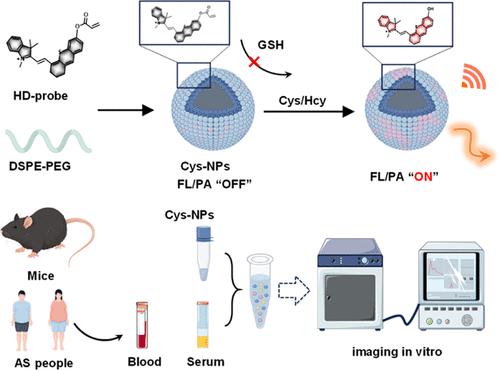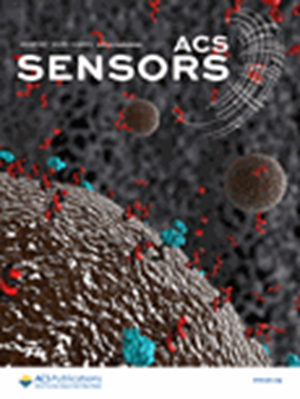基于生物传感器的半胱氨酸水平成像新方法:临床前模型和人体样本的启示
IF 8.2
1区 化学
Q1 CHEMISTRY, ANALYTICAL
引用次数: 0
摘要
心血管疾病(CVDs)对人类健康构成严重威胁,其中动脉粥样硬化是心脏病和中风的主要原因。半胱氨酸(Cys)水平的升高与心血管疾病风险的增加密切相关,凸显了半胱氨酸在心血管健康中的重要性。然而,目前检测血清和动脉粥样硬化斑块中半胱氨酸的方法在灵敏度、特异性、动态监测和侵入性等方面都存在挑战。为了准确监测半胱氨酸水平,需要开发更灵敏、特异和无创的检测方法。本研究介绍了 Cys-NPs 的开发和特性,它是一种灵敏且具有选择性的工具,可对泡沫细胞和动脉粥样硬化小鼠体内的半胱氨酸进行成像。利用 DSPE-PEG 封装 HD 探针以获得 Cys-NPs,有效减少了谷胱甘肽(GSH)的干扰,从而成功制备并验证了 Cys-NPs 的纳米级结构。同时,Cys-NPs 还能利用体内 Hcy 和 Cys 浓度的差异,更好地评估体内 Cys 水平。体外和体内研究表明,Cys-NPs 能有效成像泡沫细胞和动脉粥样硬化小鼠体内的半胱氨酸,这突显了它在缺血性心脏病研究和临床实践中对半胱氨酸水平进行无创评估的潜力。本文章由计算机程序翻译,如有差异,请以英文原文为准。

Novel Approach for Biosensor-Based Imaging of Cysteine Levels in Ischemeic Heart Disease: Insights from Preclinical Models and Human Samples
Cardiovascular diseases (CVDs) pose a serious threat to human health, with atherosclerosis being a leading cause of heart disease and stroke. Elevated cysteine (Cys) levels have been closely linked to an increased risk of cardiovascular diseases, underscoring its significance in cardiovascular health. However, current detection methods for cysteine in serum and atherosclerotic plaques present challenges in sensitivity, specificity, dynamic monitoring, and invasiveness. The development of more sensitive, specific, and noninvasive assays is needed to enable accurate monitoring of cysteine levels. This study introduces the development and characterization of Cys-NPs, a sensitive and selective tool for imaging cysteine in foam cells and atherosclerotic mice. Encapsulation of the HD-probe using DSPE-PEG to obtain Cys-NPs effectively reduced interference from glutathione (GSH), leading to successful preparation and validation of Cys-NPs’s nanoscale structure. At the same time, Cys-NPs was able to use the differences in Hcy and Cys concentrations in vivo to better assess Cys levels in vivo. In vitro and in vivo studies demonstrated Cys-NPs’s effective imaging of cysteine in foam cells and atherosclerotic mice, highlighting its potential for noninvasive assessment of cysteine levels in ischemic heart disease research and clinical practice.
求助全文
通过发布文献求助,成功后即可免费获取论文全文。
去求助
来源期刊

ACS Sensors
Chemical Engineering-Bioengineering
CiteScore
14.50
自引率
3.40%
发文量
372
期刊介绍:
ACS Sensors is a peer-reviewed research journal that focuses on the dissemination of new and original knowledge in the field of sensor science, particularly those that selectively sense chemical or biological species or processes. The journal covers a broad range of topics, including but not limited to biosensors, chemical sensors, gas sensors, intracellular sensors, single molecule sensors, cell chips, and microfluidic devices. It aims to publish articles that address conceptual advances in sensing technology applicable to various types of analytes or application papers that report on the use of existing sensing concepts in new ways or for new analytes.
 求助内容:
求助内容: 应助结果提醒方式:
应助结果提醒方式:


